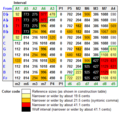File:Size of intervals in C-based asymmetric 5-limit tuning.PNG
Size_of_intervals_in_C-based_asymmetric_5-limit_tuning.PNG (455 × 433 pixels, file size: 36 KB, MIME type: image/png)
Captions
Captions
Summary
[edit]| DescriptionSize of intervals in C-based asymmetric 5-limit tuning.PNG |
English: Sizes in cents of the 144 intervals in the C-based 5-limit tuning system (asymmetric scale). The selected ratios are listed below. Bold font indicates just intervals. The values were accurately computed using Microsoft Excel, then rounded to integers. The image was produced using Microsoft Excel and captured with Microsoft Snipping Tool. |
| Date | |
| Source | Own work |
| Author | Paolo.dL |
The frequency ratios selected for this 12-tone scale, and the elementary factors from which they were computed, are shown in this table:
| Asymmetric scale | ||||||
|---|---|---|---|---|---|---|
| Factor | 1/9 | 1/3 | 1 | 3 | 9 | |
| 5 | A 5/3 |
E 5/4 |
B 15/8 |
F♯ 45/32 | ||
| 1 | F 4/3 |
C 1 |
G 3/2 |
D 9/8 | ||
| 1/5 | D♭ 16/15 |
A♭ 8/5 |
E♭ 6/5 |
B♭ 9/5 | ||
Wolf intervals are operationally defined herein as intervals composed of 3, 4, 5, 7, 8, or 9 semitones (i.e. major and minor thirds or sixths, perfect fourths or fifths, and their enharmonic equivalents) the size of which deviates by more than one syntonic comma (about 21.5 cents) from the corresponding justly intonated interval. Intervals made up of 1, 2, 6, 10, or 11 semitones (e.g. major and minor seconds or sevenths, tritones, and their enharmonic equivalents) are considered to be dissonant even when they are justly tuned, thus they are not marked as wolf intervals even when they deviate from just intonation by more than one syntonic comma.
− Paolo.dL (talk) 11:08, 29 July 2010 (UTC)
Licensing
[edit]- You are free:
- to share – to copy, distribute and transmit the work
- to remix – to adapt the work
- Under the following conditions:
- attribution – You must give appropriate credit, provide a link to the license, and indicate if changes were made. You may do so in any reasonable manner, but not in any way that suggests the licensor endorses you or your use.
- share alike – If you remix, transform, or build upon the material, you must distribute your contributions under the same or compatible license as the original.

|
Permission is granted to copy, distribute and/or modify this document under the terms of the GNU Free Documentation License, Version 1.2 or any later version published by the Free Software Foundation; with no Invariant Sections, no Front-Cover Texts, and no Back-Cover Texts. A copy of the license is included in the section entitled GNU Free Documentation License.http://www.gnu.org/copyleft/fdl.htmlGFDLGNU Free Documentation Licensetruetrue |
File history
Click on a date/time to view the file as it appeared at that time.
| Date/Time | Thumbnail | Dimensions | User | Comment | |
|---|---|---|---|---|---|
| current | 10:39, 19 August 2010 |  | 455 × 433 (36 KB) | Paolo.dL (talk | contribs) | Adding names of commas (diaschisma, lesser diesis) |
| 20:07, 29 July 2010 |  | 455 × 433 (35 KB) | Paolo.dL (talk | contribs) | Using as reference for minor sevenths the ratio 9/5 (C-Bb), rather than 16/9. | |
| 10:54, 29 July 2010 |  | 455 × 433 (35 KB) | Paolo.dL (talk | contribs) | Improved color code. Also, the previous version showed the symmetric scale, rather than the asymmetric one. | |
| 23:47, 28 July 2010 |  | 456 × 416 (34 KB) | Paolo.dL (talk | contribs) | {{Information |Description={{en|1=Sizes in cents of the 144 intervals in the C-based 5-limit tuning system. The selected ratios are listed below. Bold font indicates just intervals. The values were accurately computed using Microsoft Excel, then rounded t |
You cannot overwrite this file.
File usage on Commons
There are no pages that use this file.
